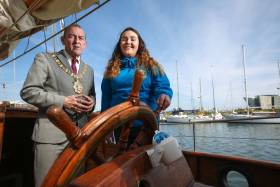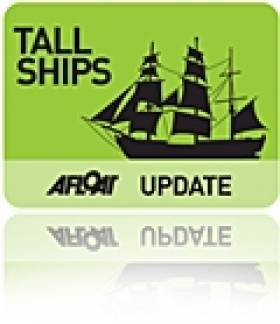Displaying items by tag: Titanic Maritime Festival
#TitanicMaritime - Belfast City welcomes some of the Tall Ships back for the Titanic Maritime Festival a three day event (28-30 May) that begins today and includes this Spring Holiday Monday in the UK.
Groups of young people from across the city have been enjoying the challenge of life on the ocean waves, thanks to Belfast City Council’s Sail Training Initiative.
A total of 30 volunteers, aged between 16 and 28 and from all parts of the city, are taking part in series of voyages on board the tall ships Maybe and Morgenster. They were scheduled to call to ports such as Dublin, Liverpool, the Isle of Man, Derry/Londonderry, Galway, Cork, Oban, Carsaig on the Isle of Mull and Lamlash on the Isle of Arran.
Lord Mayor, Councillor Arder Carson, said: “These voyages will provide the participants with a unique, challenging and inspirational experience that increases their self-awareness and self-confidence, develops their teamwork and leadership skills and creates a strong sense of community responsibility, perhaps helping them to become future civic leaders.
The Lord Mayor added “As members of trainee crews, along with trainees from Dublin, Galway and Liverpool they will be an important members of the crew and their participation in all activities is essential to the smooth running of the voyage.”
During the voyages, the trainees will help in all aspects of life on board, including trimming sails, steering and navigation.
The Belfast Titanic Maritime Festival and for further details, click here.
Belfast Secures Support For Tall Ships Return Next Summer
#TallShips - It's confirmed: Belfast will host the start of 2015's international Tall Ships Races.
According to BBC News, the tall ships will return to Belfast Lough for the first time since 2009 to coincide with next July's Titanic Maritime Festival.
The news follows more than two-and-a-half years from the original announcement by Belfast City Council, which has since secured sponsorship for its hosting of the event from German supermarket chain Lidl.
The tall-masted fleet's return to Irish shores will come three years after Dublin hosted the Tall Ships Races Festival.
BBC News has more on the story HERE.






























































